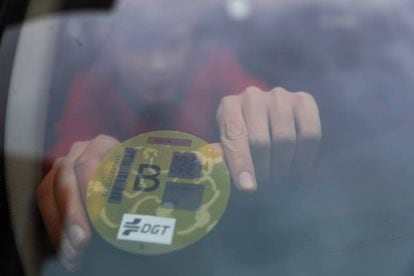A man places the DGT's yellow environmental label on the windscreen of his car.ÁLVARO GARCÍA
The Low Emissions Zone (ZBE) of Barcelona, a pioneer in Spain and one of the largest areas banned for the most polluting vehicles, is no longer enough.
Since it was released, it has managed to reduce nitrogen dioxide (NO2) emissions by 11%, as planned when it was designed in 2017. In addition, it has reduced the daily journeys of polluting vehicles by more than 600,000: they were 20% of the total of circulating fleet in 2017 and now they are 4%.
The question is, then: What is the time now to reduce pollution, which is recovering pre-pandemic levels?
The response of the government of Mayor Ada Colau is to veto the most polluting cars with a yellow label (B) from the General Directorate of Traffic (DGT) and install an urban toll to enter the city.
The council, however, admits that it will not be quick.
There is no calendar.
More information
Barcelona cuts the circulation of the most polluting cars in half
The Councilor for Climate Emergency, Eloi Badia, celebrated this Monday the impact of the ZBE, which ultimately seeks to improve people's health.
Because urban traffic is the main source of air pollution in the city, the Councilor for Health, Gemma Tarafa, has stressed.
The mayor has recalled that pollution causes a thousand premature deaths a year and has revealed that according to a report from the City Council, the improvement of the circulating park prevents 125 deaths each year.
But it is not enough, the councilors have admitted.
With the cars that do not have a label removed from circulation, the next step, then, is to reduce the most polluting in this scenario: those with a yellow label.
And within this group, the euro 4, the diesel registered between 2006 and 2009. "Cars with a yellow label have also been reduced since 2017: they represented 47% and now 24%", Badia has celebrated, who always remembers that the yellow labels cover a very long registration period, "which could hardly be banned all at once."
The councilor is in favor of first vetoing euro 4 vehicles.
The AMB proposed vetoing cars with a yellow label in 2022, but it was ruled out during the pandemic, which also led to the extension of successive moratoriums on polluting cars that were allowed to circulate.
"Now we do have on the table that the ban could evolve to the yellow label, especially the Euro 4, which has very high levels of contamination", said the councilor, who has admitted that it will not be immediate: "There is no calendar, it is necessary to speak with other administrations and sectors, and to know the amortization schedules of professional vehicles, such as light vans”.
On the idea of the toll against pollution, which in 2019 he defended even the mayor, Badia now recalls that it is the responsibility of the Generalitat: "In the last conversation I did not plan it: without ruling it out, I did not contemplate it," he said and asked that the working group that was agreed upon at the Second Summit on Air Quality be constituted.
In the draft of the future Law on Sustainable Mobility that the Government is preparing, she has highlighted, Barcelona has requested authorization from the City Councils with the most polluted cities to be able to apply it.
"It will not be fast or imminent, the situation is not good either," she concluded.
Other consequences of the implementation of the ZBE in Barcelona have been that 13,300 citizens have looted old cars or motorcycles and have been able to request the T-Green free public transport for three years.
In the record of specific authorizations to circulate with vehicles without a label, 26,000 people have signed up who have requested an average of 3.3 permits per year (far from the 10 that they could request).
And in terms of fines, 70,000 have been imposed.
Few, Badia explained, when compared to other traffic offenses such as speeding.
“It is a low value, it shows a high degree of compliance and that the ZBE has been understood”, she applauded.
Pollution levels soar during the last quarter
While the council says that the ZBE does not give more of itself and has fulfilled its initial objectives, pollution does not stop rising in Barcelona.
The levels prior to the pandemic have not yet been reached and in 2021 the legal values were not exceeded, but the figures from the measurement stations point to widespread growth in NO2 emissions as of September.
The return to work after the holidays coincided with less teleworking, the disappearance of tolls and a long anticyclone.
The Eixample station, located at the intersection between Urgell and Valencia, began the year with a monthly value of 32 micrograms of nitrogen dioxide per cubic meter in January and reached 46 in December (when the legal limit is 40).
On average, the station closed the year with an average of 38, still within the legality.

